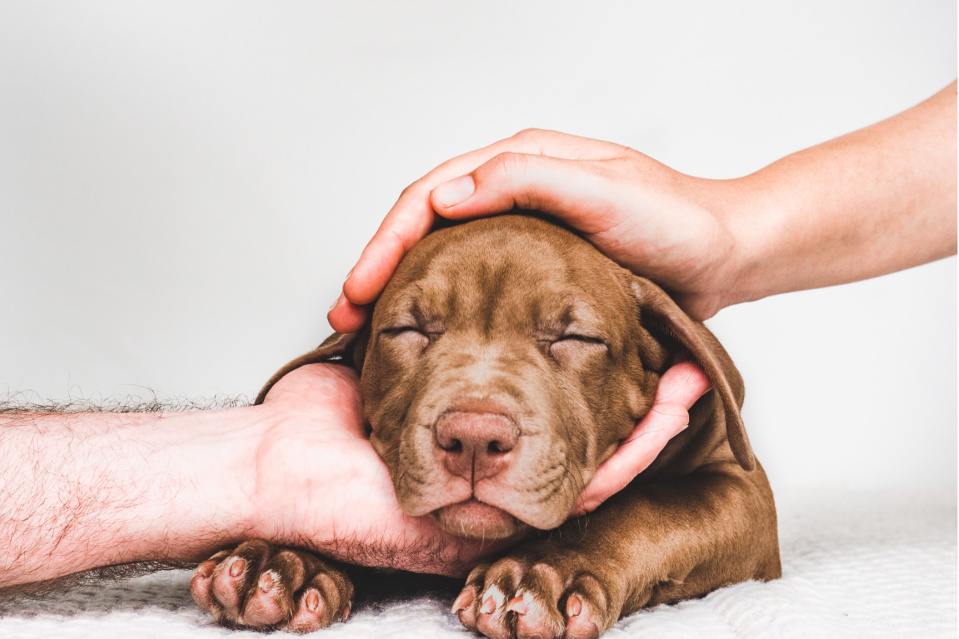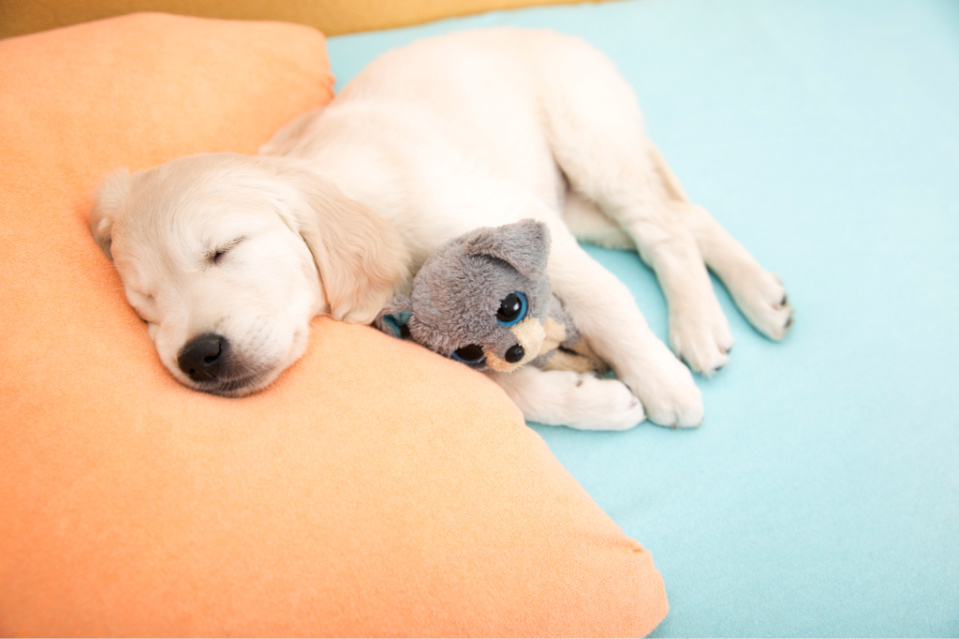Puppies, especially Labradors, are naturally full of energy and happiness. However, if your dog acts differently than they normally do, you may have an overtired Lab puppy in your midst.
Here is everything you need to know about an overtired Labrador puppy.
Why Is My Lab Puppy Exhausted?
There could be one or a mixture of reasons why your Lab pup is overtired. For instance, if your pup has an infectious disease like canine parvovirus, it can make your puppy feel depressed and lethargic.
Other conditions can also cause exhaustion in Lab pups. Some other conditions and illnesses include fevers, malnutrition, anemia, pneumonia, and congenital heart disease.
Parasites, such as hookworms, may also be a reason why you have an overtired Lab puppy. Parasites like ticks and fleas drink blood. If it becomes a severe infestation, it can cause anemia and lethargy.
Of course, overexercising your Labrador could be another reason. Puppies have lots of energy, but they have their limits, too. Once your Labrador Retriever puppy starts to pant or lie down frequently while you play or exercise, give them time to let them rest.
Stress can also make your pup look and/or feel overtired. Think about how you feel when you are stressed for a long time—you may feel lethargic and tired, and your pup would feel the same way.
Symptoms of An Overtired Lab Puppy
If your Lab puppy feels exhausted, they may have one or a mixture of any of the following symptoms:
- Loss of appetite
- Change in personality and/or mood (irritability, lethargy, depression, etc.)
- Ignoring you, especially when called
- No interest in activities or toys
- Shortness of breath
- Diarrhea
- Vomiting
What Should I Do if My Puppy Has Some of These Symptoms?
First of all, it would be best to bring your puppy to a veterinarian. While these are common symptoms of an exhausted puppy, it could also be symptoms of an underlying condition. It would be best to bring your Lab pup to a vet first to rule out any other illnesses and conditions.
If you brought your pup to the vet, and the vet determines that it is exhaustion and not any other condition or illness, then you can try any of the tips below.
How to Calm an Overtired Puppy

If your puppy looks exhausted because they experience stress, then you can make them exercise. Try not to do any high-impact exercise, however. Instead, you can go for low-impact exercises like walking or jogging.
Try not to do it for too long, too. Low-impact exercise will keep their mind off of their worries and help burn out any nervousness that they may feel.
If your Labrador Retriever looks like they feel stress, you can also try to hold them or pet them. They will instantly feel calmer by your touch, especially if your dog trusts you. Some Labrador pups may also enjoy being wrapped in a warm blanket and seeing you.
How to Exercise your Lab Without Exhausting Them
As mentioned earlier, exercise is a good way to relieve stress. Plus, exercise is essential to keep your dog healthy. The goal here is to make sure that you do not exhaust your Labrador pup.
Once you see signs of exhaustion, such as panting and sluggish behavior, while your dog exercises, try to make them rest immediately. This includes instances when your dog feels tired after a short walk. You should not push your pup too much because it can do more harm than good.
You can follow the general rule of puppy exercise by using their age by months to know how long they can exercise. For every month that is added to their age, they can do 5 minutes of exercise. They can do more than that when they are adults.
For example, if your Labrador puppy is 2 months old, they can exercise for 10 minutes a day, up to 2 times a day. If your Lab is 5 months old, they can exercise for 25 minutes a day, up to 2 times a day. Of course, if your puppy seems tired before that time, have them take a break.
What if My Overtired Puppy Won’t Sleep?
If you obviously have an overtired Lab puppy, but they refuse to nap, there are a few things you can do.

First, you can set a schedule for them. Labradors need structure in their lives.
For instance, you can try to let things settle down in your home between 1pm to 4 pm. That way, your puppy will have enough peace to get rest.
You can also try to crate train your puppy or show them their comfy bed. Make sure they have a quiet spot where they know they can peacefully sleep whenever they want.
Crating is efficient for stubborn Lab puppies who refuse to sleep. You can put them in a crate in a quiet room during their nap time, and they will eventually sleep.
However, some dogs may feel stressed with a crate. You can be near them while they are in the crate to calm them down. It help make them understand that the crate is not punishment, but a place to rest.
You can also try to exercise your little Labrador Retriever about 30-60 minutes before nap time. Try not to do it right before nap time, though. Their blood will still be rushing, and they will have some adrenaline left in them, so they may not be ready to rest just yet.
How Much Rest Does My Lab Puppy Need?
Puppies are like babies—they will spend most of their time sleeping. Most puppies will sleep for 30-120 minutes per nap. Depending on your puppy’s age, they can even sleep for 14-20 hours a day.
You may notice that your pup randomly falls asleep while playing or eating, especially if they are very young. That is fine. Try to avoid disturbing them, especially if they are comfortable and safe.
Most young Lab puppies will struggle to sleep throughout the night. However, they often can once they are 4 months old. Most puppies will sleep for at least 6-10 hours every night.
To Conclude
Labrador puppies need lots of rest to grow. Some pups will be like real children—they may find it hard to nap even when they exhaust themselves. You can follow any of the advice above to know why your puppy is overtired and what you can do.







